Unit 1 How do you study for a test教案
九年级英语下册《Unit1Howdoyoustudyforatest.(通用)》教案
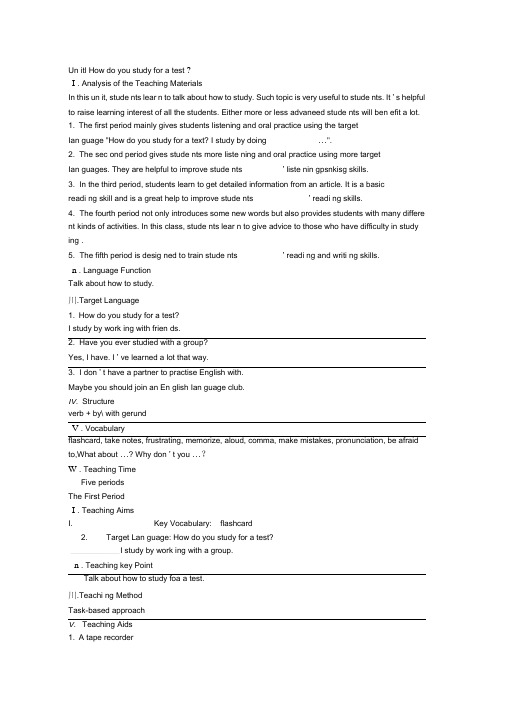
Un itl How do you study for a test ?I . Analysis of the Teaching MaterialsIn this un it, stude nts lear n to talk about how to study. Such topic is very useful to stude nts. It ' s helpful to raise learning interest of all the students. Either more or less advaneed stude nts will ben efit a lot.1. The first period mainly gives students listening and oral practice using the targetIan guage "How do you study for a text? I study by doing …".2. The sec ond period gives stude nts more liste ning and oral practice using more targetIan guages. They are helpful to improve stude nts ' liste nin gpsnkisg skills.3. In the third period, students learn to get detailed information from an article. It is a basicreadi ng skill and is a great help to improve stude nts ' readi ng skills.4. The fourth period not only introduces some new words but also provides students with many differe nt kinds of activities. In this class, stude nts lear n to give advice to those who have difficulty in study ing .5. The fifth period is desig ned to train stude nts ' readi ng and writi ng skills.n . Language FunctionTalk about how to study.川.Target Language1. How do you study for a test?I study by work ing with frien ds.2. Have you ever studied with a group?Yes, I have. I ' ve learned a lot that way.3. I don ' t have a partner to practise English with.Maybe you should join an En glish Ian guage club.IV. Structureverb + by\ with gerundV . Vocabularyflashcard, take notes, frustrating, memorize, aloud, comma, make mistakes, pronunciation, be afraid to,What about …? Why don ' t you …?W . Teaching TimeFive periodsThe First PeriodI . Teaching AimsI. Key Vocabulary: flashcard2. Target Lan guage: How do you study for a test?___________ I study by work ing with a group.n . Teaching key PointTalk about how to study foa a test.川.Teachi ng MethodTask-based approachV. Teaching Aids1. A tape recorder2. Real objectsV . Teaching ProceduresStep I GreetingsT: Did you have a good time during the summer holidays?Where did you go? What did you do?Ask some stude nts to describe their summer holidays.Step n Lead-inT: Is today a special day?(Lead the students to answer: It ' s the first day of the new term)T: What are your new term ' s resolutions?s ask them (Lead the students to answer: I ' m going to get good grades.)T: Last term,Wa ng L inyuan and Zhao Ting got good grades in En glish; let how to study En glish well.T: Wang Linyuan, how do you study for an En glish test?(With the short con versati ons betwee n the teacher and the stude nts,the teacher lead in thenew text----how to study for a text.) Step 川Teach 1aT: How do you study for a test? (Write on the blackboard)S: I study for a test read the textbook.Teacher correct the an swer: Oh, you study by readi ng the textbook.(Let stude nts give differe nt an swers,a nd emphasize verb+by\with gerun d.)1. Show some real thin gs, like flashcards,tapes, the textbook and vocabulary lists,to in troduce theways in 1a.2. Ask the stude nts to tell other ways of lear ning En glish.Sample an swersa. by joining a study groupb. by practis ing con versati ons with my friendsc. by read ing aloud every morningd. by watch ing En glish-la nguage TVNote:A flashcard is a piece of paper or card which students write a word on and use it to memorize in formati on.Step IV 1bThis activity provides stude nts practice in un dersta nding the target Ian guage in spoke n con versati on.1. Let the stude nts look at the pictures in 1b,ask them to tell the ways of lear ning:by making flashcards, by liste ning to tapes,by ask ing the teacher for help2. liste n to the tape, let stude nts write the correct letters.(Comb ine the liste ning task and speak ing task.)T: You will hear one con versati on. You are asked to write the letter of each picture in front of the n ameof the pers on who studies that way.Point out the sample an swer to the class.T: Mei says, "I study by making flashcards. "so the an swer to nu mber 1 is a.Play the recording for the first time.Students only listen. Play the recording a second time. Students write down their answers.Check the an swers with the whole class.An swers1. a2. c3. bStep V 1cThis activity gives stude nts oral practice using the target Ian guage.Read the in struct ions to the class.1. In vite a pair of stude nts to read the con versati on to the class,S1: How do you study for a test?S2: I study by work ing with a group.2. Write the con versati on on the blackboard. The n dem on strate a new con versati on withano ther stude nt.T: How do you study for a test?S3: I study by making flashcards.3. Stude nts work in pairs ,and excha nge the ways of study ing.As stude nts work, teacher walks around and helps with pronun ciati on as n eeded.4. Ask pairs of stude nts to come to the front of the classroom and act out their con versati ons.'ve Step W SummaryT: In this c lass, we ' ve learned some key vocabulary words, such as flashcard. And we also lear nedthe target Ian guages How do you study for a test? I study by work ing with a group.Step Vfl HomeworkAsk stude nts to in terview stude nts in other classes, family members, and friends to try to discoversome new ways of studying that haven ' t been introduced in the book or in class.Step 忸Blackboard DesignUn it 1 How do you study for a test?Section AThe First Period1. Target la nguagesA: How do you study for a test?B: I study by work ing with a group.2. Ways of study ing:by work ing with Frie ndsby making flashcardsby read ing the textbookby maki ng vocabulary listsby liste ning to tapesby ask ing the teacher for help。
Unit1_How_do_you_study_for_a_test教案人教新目标九年级上
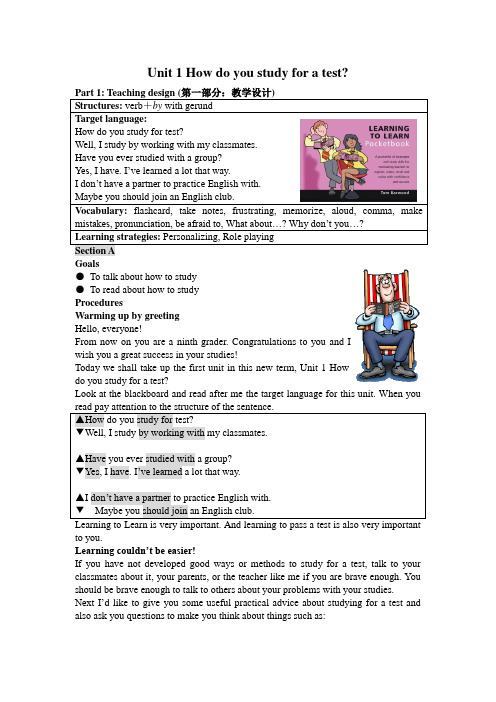
Unit 1 How do you study for a test?Part 1: Teaching design (第一部分:教学设计)Structures: verb+by with gerundTarget language:How do you study for test?Well, I study by working with my classmates.Have you ever studied with a group?Yes, I have. I’ve learned a lot that way.I don’t have a partner to practice English with.Maybe you should join an English club.Vocabulary: flashcard, take notes, frustrating, memorize, aloud, comma, make mistakes, pronunciation, be afraid to, What about…? Why don’t you…?Learning strategies: Personalizing, Role playingSection AGoals●To talk about how to study●To read about how to studyProceduresWarming up by greetingHello, everyone!From now on you are a ninth grader. Congratulations to you and Iwish you a great success in your studies!Today we shall take up the first unit in this new term, Unit 1 Howdo you study for a test?Look at the blackboard and read after me the target language for this unit. When you read pay attention to the structure of the sentence.▲How do you study for test?▼Well, I study by working with my classmates.▲Have you ever studied with a group?▼Yes, I have. I’ve learned a lot that way.▲I don’t have a partner to practice English with.▼Maybe you should join an English club.Learning to Learn is very important. And learning to pass a test is also very important to you.Learning couldn’t be easier!If you have not developed good ways or methods to study for a test, talk to your classmates about it, your parents, or the teacher like me if you are brave enough. You should be brave enough to talk to others about your problems with your studies.Next I’d like to give you some useful practical advice about studying for a test and also ask you questions to make you think about things such as:▲motivation▲how to learn your lessons in the ninth grade year▲different modes of teaching you may meet▲how to develop particular skills, such as note-taking in class1A: Checking the ways you studyI study for a test___By reading to the tape; By underlining the expressions; By reading beyondthe text; By doing used exam papers; By going over exercises books; Bycopying down the text; By learning the text by heart; By speaking with classmatesthe added ways on the blackboard.1b Listening and writingListen to understand how these people in the picture on page 2 study for a test. Write letters from the pictures. While listening, pay attention to the structures of the sentences.Section A 1b TapescriptBoy1:Hey, gang. There’s a big test on Tuesday. I really need some help. Can you tell me how you study for a big test?Voices: Sure! Yes. Sure we will.Boy1:You did really well on the last English test, didn’t you,Mei?Girl1: Yeah, I did OK.Boy1: Well, how did you study?Girl1:By making flashcards.Boy1:Maybe I’ll try that. How did you study, Pierre?Boy2: By asking the teacher for help. She was really happy I asked.Boy1:That’s interesting. How do you study, Antonio?Boy3: I like to study by listening to cassettes. But sometimes my mot her thinks I’m listening to music. And then she gets mad.Boy1:Oh, well…A: How do you study for a test?B: I study by working with a group.C: I study by listening to English.D. I study by playing games with my classmates.E. I study by doing actions such as coloring, matching.F. I study by singing English songs.G. I study by writing letters and emails.H. I study by acting out simple dialogues.I. I study by listening to and understanding stories.J. I study by writing simple sentences.K. I study by imitating from the recording.L. I study by speaking out words or phrases.M. I study by doing simple role plays.N. I study by reading and understanding simple stories.O. I study by using daily expressions.P. I study by performing short plays.Q. I study by performing simple rhymes.R. I study by writing sentences for pictures.S. I study by writing out simple poems.T. I study by reading aloud correctly.U. I study by playing text plays.V. I study by working with classmates.W. I study by going over the text before class.X. I study by copying words and expressions.Y. I study by looking and saying.Z. I study by asking others questions.2a Listening and checkingNow let’s go to page 3. Listen to the tape and check the questions you ask.While listening, pay attention to the structures of the sentences.Section A 2a, 2b TapescriptGirl1:Welcome to the English club. Today we’re going to talk about the best ways to learn English. Who has an idea?Boy1: Do you learn English by watching English-language videos?Girl2:No. It’s too hard to understand the voices.Boy1: What about keeping a diary in English? Do you learn English that way?Girl2:I think so. It helps to write English every day.Girl3: Have you ever studied with a group?Girl2:Yes, I have! I’ve learned a lot that way.Girl1: Do you ever practice conversations with a friend?Girl2:Oh, yes. It improves my speaking skills.Boy1: What about reading aloud to practice pronunciation?Girl3: I do that sometimes. I think it helps.Boy2: I do too. And I always look up new words in a dictionary.Girl3:That’s a great idea!2b Listening and matchingListen again and match each question from 2a with an answer in the box on page 3.2c Doing a pairworkNext we are going to make a conversation in pairs using the information from activities 2a and 2b.A: Have you ever studied with a group?B: Yes, I have. I’ve learned a lot that way.A: Have you ever learned English by watching videos?B:Yes, I have. I’ve learned a lot that way.A: Have you ever practiced conversations with friends?B:Yes, I have. I’ve learned a lot that way.A: Have you ever listened to tapes?B:Yes, I have. I’ve learned a lot that way.A: Have you ever read aloud to practice pronunciation?B:Yes, I have. I’ve learned a lot that way.1.Reading to the tapeWe are going to read the article on page 4. First we shall readto the tape together. That is, we start reading aloud as therecorder goes, and we stop reading aloud as the recorderstops. While reading, let’s pay enough attention to the pauses,the pronunciation and the intonation of the native reader.M ake our reading aloud as the same as the reader’s.2.Reading and dividing the article into partsNext we are going to read aloud the article slowly and clearly. We will try to divide it into thought groups.3.Reading and underliningThis week/ we asked students/ at New Star High School/ about the best ways/ to learn more English. Many said/ they learnt/ by using English. Some students had more specific suggestions. Lillian Li, for example, said/ the best way/ to learn new words/ was by reading English magazines. She said that/ memorizing the words of pop songs/ also helped/ a little. When we asked about studying grammar/ she said, “I never study grammar. It's too boring.”Wei Ming feels differently. He's been learning English/ for six years/ and really loves it. He thinks/ studying grammar /is a great way/ to learn a language. He also thinks that/ watching English movies/ isn't a bad way/ because he can watch the actors/ say the words. Sometimes, however, he finds watching movies/ frustrating/ because the people speak too quickly.Lin Chang said that/ joining the English club/ at school/ was thebest way/ to improve her English. Students get lots of practice/ andthey also have fun. She added that/ having conversations/ withfriends/ was not helpful/ at all. "We get excited/ about something/and then/ end up speaking/ in Chinese,” she said.Ways of learning EnglishNot successful OK SuccessfulLillian Li Studyinggrammar memorizing thewords of pop songsreading EnglishmagazinesWei Ming watching movies watching English studying grammarmoviesLiu Chang havingconversations/ withfriends joining the English clubSilence, please! We are going to have a role play in pairs. One of the pair is to be one Zhao: Excuse me, Li Hong. Could you help me with my English?Li: Yes, please. What’s the matter?Zhao: I have difficulty studying grammar.Li: Grammar? I never studying grammar. I study English mostly by memorizing the words of pop songs.Zhao: No grammar at all?Li:Yes, I did study grammar. But I study it by reading English magazines. I put grammar learning into reading articles. That is the best way to understand English grammar.Turn to page 4 to check √what you do to learn English in the box.Closing down by asking and answering—How did you learn English?*I listened to English them every day.**I learned many English songs by heart.*I sang the English songs to myself.*I learned every new English word in the text.*I learn English by going to English classes.*I do English homework at school.*I read English textbooks in the evening.*I speak English very slowly.**I read a lot of English sentences in the morning.*I do well in class English tests.*I get a lot of good advice on learning English from my teacher.*I discuss English problems with my classmates.*I follow the advice from my father.*I learn English sounds from the tape.*I use English-English dictionaries.*I listen to recordings and English-language TV.*I talk to native speakers every chance I got.*I read books in English, mostly novels.*I learn a lot of new words from English books.*I write more and more e-mail in English.*I use English more than my first language.*Most of my reading (websites and books) is in English.Section BGoals●To listen about learning English●To talk about learning English●To read about learning EnglishProceduresWarming up by reading to the recordingHello, everyone. To begin with, let’s listen and read to the recording of the text HOW DO YOU LEARN BEST? That is, read aloud to the tape, as fast as the tape goes, as clearly as the native reader reads. OK? Here we go!My cat speaks English.Sometimes my cat comes to me and tells me that she is hungry. Or that her leg hurts. How does my cat tell me these things? I don't speak pussy-cat language.1a Reading and checkingLearning English can be both easy and difficult. Whatthings are easy for you? And what things are difficult foryou? Now turn to page 5, read the list on the top and check√the statements that are true for you.1b Making a listYou have read and checked the statements true for you.Now think and make a list of other things difficult for you,too.I don’t know how to…!1. I don’t know how to use commas.2. I don’t know how to work with others.3. I don’t know how to make flashcards.4. I don’t know how to read the textbook.5. I don’t know how to make vocabulary lists.6. I don’t know how to listen to tape.7. I don’t know how to ask the teacher for help.8. I don’t know how to study for a test.9. I don’t know how to work with a group.10. I don’t know how to watch English videos.11. I don’t know how to practice conversations with friends.12. I don’t know how to read aloud to practice pronunciation.13. I don’t know how to learn by using English.14. I don’t know how to get more specific sug gestions.15. I don’t know how to read English magazines.16. I don’t know how to learn new words.17. I don’t know how to memorize the words.18. I don’t know how to studying grammar19. I don’t know how to watching English movies20. I don’t know how to joining the English club21. I don’t know how to improve her English22. I don’t know how to get lots of practice13. I don’t know how to ask teachers about the best ways to learn more English.2a Listening and checkingPaul is a nice boy. He works hard at his English, but still has many learning challenges. Now listen to find out what challenges he has and check them in the box on page 5.Challenges to Paul at learning English1._____ can’t get the pronunciation right.2._____ forget a lot of new words.3._____ can’t understand when people talk to me.4._____ can’t understand the words in magazines.5._____ don’t get much writing practices.2b Listening and matchingNow listen again to Paul talking about his challenges at learning English and match them with the solutions listed in the box on page 5. While listening, pay attention to the structures of the sentences.TapescriptTeacher:You look worried, Paul.Boy:I am, Ms Mitchell. I’m having trouble learning English.Teacher:You said you liked English. What’s the problem?Boy:I can’t get the pronunciation right.Teacher:Well, listening can help. Why don’t you borrow theteacher’s tapes? You can listen to them at home and repeatthe sentences that are difficult for you.Boy:That’s a good idea. But what about all the new words? I forget a lot of new words.Teacher:You can always write the new words in your notebook and study them at home. You can even study in the train on the way to school.Boy: That might really help! Thanks.Teacher:Can you understand when people talk to you?Boy:Well, no. Not always. Sometimes I just don’t understand what people are saying. Teacher:Why don’t you join an English language club to practice speaking English?The English club meets after school on Tuesdays and Thursdays.Boy:Maybe I’ll go. The only other problem I have is that I don’t get much writing practice.Teacher:Maybe you should find a pen pal.Boy: That sounds like a fun way to practice writing. Thanks, Ms Mitchell.2c Doing pairworkIN pairs we are going to role play conversations using the information from activities 2a and 2b.I don’t have a partner to practice English with. Maybe you should join an English language club.I can’t get the pronunciation right.Listening can help.I forget a lot of new words. Write the new words on cards and studythem daily.I can’t understand when people talk to me. You can join an English club to talk to people more in English.I can’t understand the words inmagazines.You can look them up in a dictionary.I don’t get much writing practices.Start writing an English diary every day.I read very slowly. You should read to the recording of thetext.I make mistakes in grammar. Why don’t study the basic sentencepatterns3a Reading and cuttingWe are going to read the text again to study the form and function ofall the predicate verbs.How I learned to learn EnglishLast year/ my English class/ was difficult/ for me. First of all, it wasn't easy/ for me/ to understand the teacher/ when she talked to the class. To begin with, she spoke/ too quickly, and I couldn't understand every word. Later on, I realized that/ it doesn't matter/ if you don’t understand/every word. Also/ I was afraid to speak/ in class, because/ I thought/ my classmates/ might laugh at me. I couldn't always make complete sentences, either. Then/ I started to watch English-language TV. It helped/ a lot. I think that/ doing lots of listening practice/ is of the secrets of becoming a good language learner. Another thing/ that I found/ very difficult/ was English grammar. So/ I decided to take lots of grammar notes/ in every class. Then/ I started to write my own original sentences/ using the grammar/(that) I was learning. It’s amazing/ how much/ this helped. Now/ I am enjoying learning English/ and I got an A/ this term. My teacher is very impressed.Now you may read the statements in the box on page 6 following the text. Write “T” or “F” beside each statement.3b Writing a letterDear Lin Feng,I know it isn’t easy to learn English, but I have some ideas that may help. You said you couldn’t understand people who talked fast. Well, you cantry to listen for the most important words, not every word. It isdifficult to understand by listening what you have not read orwhat you can’t understand well by reading. To listen well youhave to read well. So keep on reading English. Listening andreading to the recording of the text is very important, too. Everytext, after being read, should be listened to and read aloud to the tape. At first you may find it difficult to follow the reader reading aloud the text. Don’t worry. If you keep practicing you will be able to read aloud as fast as the native reader from the tape. And then you can understand people who talk fast in English.Yours,Tai Zuo4 Doing an interviewNext we shall do an interview in groups of four. Ask the three group mates about learning English. Take notes of what they say. Tomorrow you shall stand to tell the Q. What isn’t easy about learningEnglish?A. Reading is not easy.Q. What do you do about this? A. I try to cut the sentences into thoughtgroups.Q. What is your favorite way to learn more English? I read and read aloud a lot. These are the best way.Rain, rain, go away,Come again another day,Little JohnnyWants to play.Rain, rain, go to Spain,Never show your face again.SELF CHECK1.Filling in the blankWe shall make a check on our use of expressions first. Turn to page 7 and fill in each blank with the correct word given. Change the form of the word if necessary. ThenComplete the sentences Make your sentences1. You should write down new Englishwords in a vocabulary list.Don’t trust your memory. Write it down.2. If you don’t know how to spell newwords, look them up in a dictionary.I don’t know how to spell your name.3. The best way to improve your Englishis to join an English club.I’d like to join the school football tea.4. Another thing that he find very difficultwas English grammar.I find it easy to learn English.5. This kind of paper feels very soft. Do you feel cold?Turn to page 7 and write an article about Xu Zheng using the notes on Xu and his essay.As English is learned mostly through reading in China, we shall now turn to page 8 to learn to read the article entitled: How do we deal with our problem?Before reading,please go over the vocabulary list for reading on page 146. Get yourself familiarized with all the words and expressions to be found in the article.Tips for BeginnersYou are like a new babyBabies learn their language slowly.First they learn to listen.Then they learn to talk.Finally, they can read and write.Listen to English every dayListen to English radio.Watch English TV.Go to English movies.Use online lessons.Make an English/ESL friendMake up conversations.Practice dialogues.Use beginner textbooks.Read English storiesStart with children's storybooks.Try ESL readers.Read advertisements, signs and labels.Write down new wordsStart a vocabulary (new word) notebook. Write words in alphabetical order (A...B...C...). Make example sentences.Always use an English-English dictionary first. Keep an English diaryStart with one sentence.How do you feel?How is the weather?What did you do today?Write another sentence tomorrow. Visit an English speaking country Learn English more quickly. Stay with an English family. Hear native speakers talk.Have a fun experience.。
新目标人教版九年级unit1教案
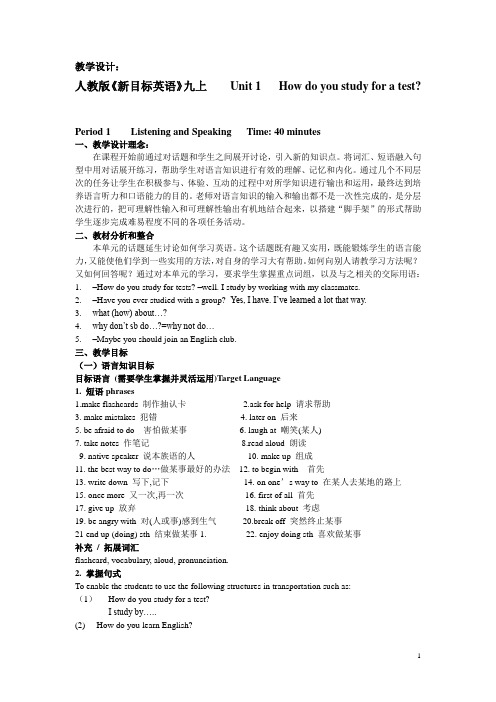
教学设计:人教版《新目标英语》九上Unit 1 How do you study for a test?Period 1 Listening and Speaking Time: 40 minutes一、教学设计理念:在课程开始前通过对话题和学生之间展开讨论,引入新的知识点。
将词汇、短语融入句型中用对话展开练习,帮助学生对语言知识进行有效的理解、记忆和内化。
通过几个不同层次的任务让学生在积极参与、体验、互动的过程中对所学知识进行输出和运用,最终达到培养语言听力和口语能力的目的。
老师对语言知识的输入和输出都不是一次性完成的,是分层次进行的,把可理解性输入和可理解性输出有机地结合起来,以搭建“脚手架”的形式帮助学生逐步完成难易程度不同的各项任务活动。
二、教材分析和整合本单元的话题延生讨论如何学习英语。
这个话题既有趣又实用,既能锻炼学生的语言能力,又能使他们学到一些实用的方法,对自身的学习大有帮助。
如何向别人请教学习方法呢?又如何回答呢?通过对本单元的学习,要求学生掌握重点词组,以及与之相关的交际用语:1. –How do you study for tests? –well. I study by working with my classmates.2. –Have you ever studied with a group?- Yes, I have. I’ve learned a lot that way.3. what (how) about…?4. why don’t sb do…?=why not do…5. –Maybe you should join an English club.三、教学目标(一)语言知识目标目标语言(需要学生掌握并灵活运用)Target Language1. 短语phrases1.make flashcards 制作抽认卡2.ask for help 请求帮助3. make mistakes 犯错4. later on 后来5. be afraid to do 害怕做某事6. laugh at 嘲笑(某人)7. take notes 作笔记8.read aloud 朗读9. native speaker 说本族语的人10. make up 组成11. the best way to do…做某事最好的办法12. to begin with 首先13. write down 写下,记下14. on one’s way to 在某人去某地的路上15. once more 又一次,再一次16. first of all 首先17. give up 放弃18. think about 考虑19. be angry with 对(人或事)感到生气20.break off 突然终止某事21 end up (doing) sth 结束做某事1. 22. enjoy doing sth 喜欢做某事补充/ 拓展词汇flashcard, vocabulary, aloud, pronunciation.2. 掌握句式To enable the students to use the following structures in transportation such as:(1)----How do you study for a test?----I study by…..(2)----How do you learn English?----I learn by….(3)----Do you learn English by…?----Yes, I do / No, I don’t.(4)----Have you ever studied with a group?----Yes, I have. I’ve learned a lot that way.(二)语言技能目标1.学会谈论如何学英语。
《Unit 1 How do you study for a test?》教案(3)(1)
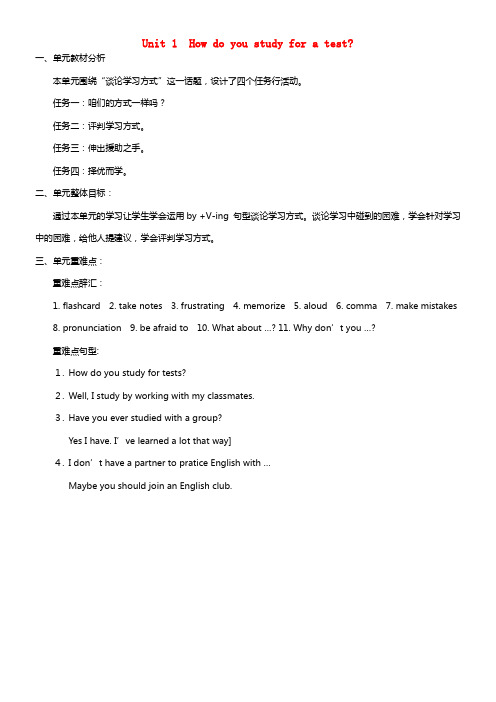
Unit 1 How do you study for a test?一、单元教材分析本单元围绕“谈论学习方式”这一话题,设计了四个任务行活动。
任务一:咱们的方式一样吗?任务二:评判学习方式。
任务三:伸出援助之手。
任务四:择优而学。
二、单元整体目标:通过本单元的学习让学生学会运用by +V-ing 句型谈论学习方式。
谈论学习中碰到的困难,学会针对学习中的困难,给他人提建议,学会评判学习方式。
三、单元重难点:重难点辞汇:1. flashcard2. take notes3. frustrating4. memorize5. aloud6. comma7. make mistakes8. pronunciation 9. be afraid to 10. What about …? 11. Why don’t you …?重难点句型:1.How do you study for tests?2.Well, I study by working with my classmates.3.Have you ever studied with a group?Yes I have. I’ve learned a lot that way]4.I don’t have a partner to pratice English with …Maybe you should join an English club.四、单元教学方式:采纳Concluding, Role playing 和Comparing 的学习策略,来展开课堂pairwork 问大师的口语交际活动和讨论活动来谈论名人所采纳的学习方式。
辞汇教学:情景操练,反复利用。
口语教学;师生互动,生生互动,对话练习,交际活动。
阅读教学:利用词典等工具书,依照上下文查寻词义。
语法教学:总结规律,仿照操练。
五、单元课时分派:本单元用四课时;第一课时―――语法和辞汇第二课时―――听说第三课时―――读写第四课时―――综合训练Unit 1 How do you study English?The first period ( grammar and vocabulary )1.知识目标:重点辞汇:flashcard, take notes, frustrating, memorize, aloud, comma, make mistakes, pronunciation, be afraid to, what about, why don’tyou…?重点句型:How do you study for tests? /Well. I study by working with my classmates.Have you ever studied with a group? /Yes, I have. I’ve learned a lot that way.I don’t have a partner to practice English with. /Maybe youshould join an English club.2.能力目标:⑴学会谈论学习方式⑵学会谈论学习中碰到的困难⑶学会针对学习中的困难,给他人提建议⑷学会评判学习方式二.教学重难点:1.重点:verb + by with gerund2.难点:运用所学知识谈论学习中的困难,并能提出相应建议。
2019-2020年九年级英语Unit1Howdoyoustudyforatest教案人教新目标版
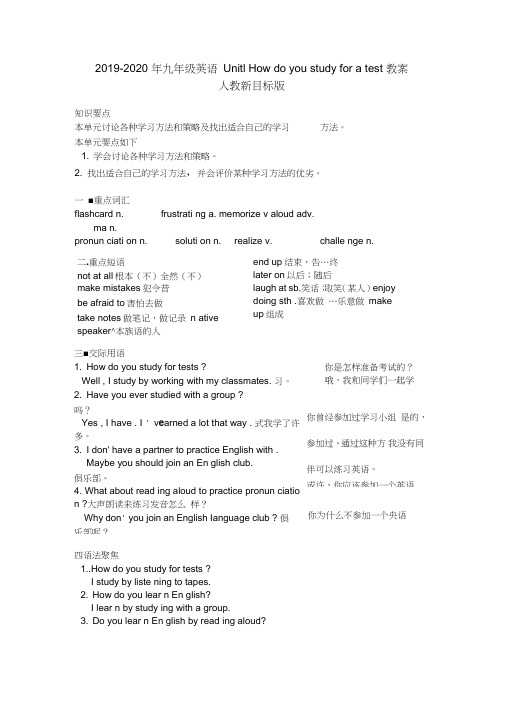
2019-2020 年九年级英语 Unitl How do you study for a test 教案人教新目标版知识要点本单元讨论各种学习方法和策略及找出适合自己的学习 方法。
本单元要点如下1. 学会讨论各种学习方法和策略。
2. 找出适合自己的学习方法,并会评价某种学习方法的优劣。
一 ■重点词汇flashcard n.frustrati ng a. memorize v aloud adv.ma n.pronun ciati on n.soluti on n.realize v.challe nge n.二.重点短语not at all 根本(不)全然(不) make mistakes 犯令昔 be afraid to 害怕去做take notes 做笔记,做记录 n ative speaker ^本族语的人end up 结束,告…终 later on 以后;随后 laugh at sb.笑话;取笑(某人) enjoy doing sth .喜欢做 …乐意做 make up 组成三■交际用语1. How do you study for tests ?Well , I study by working with my classmates. 习。
2. Have you ever studied with a group ?吗?Yes , I have . I ' v e arned a lot that way . 式我学了许多。
3. I don' have a partner to practice English with .Maybe you should join an En glish club.俱乐部。
4. What about read ing aloud to practice pronun ciatio n ?大声朗读来练习发音怎么 样?Why don ' you join an English Ianguage club ? 俱乐部呢?你为什么不参加一个央语 四语法聚焦1..How do you study for tests ?I study by liste ning to tapes. 2. How do you lear n En glish?I lear n by study ing with a group.3. Do you lear n En glish by read ing aloud?你是怎样准备考试的? 哦,我和同学们一起学你曾经参加过学习小组 是的,参加过。
人教版九年级英语Unit 1 How do you study for a test- Section A教案及教学反思
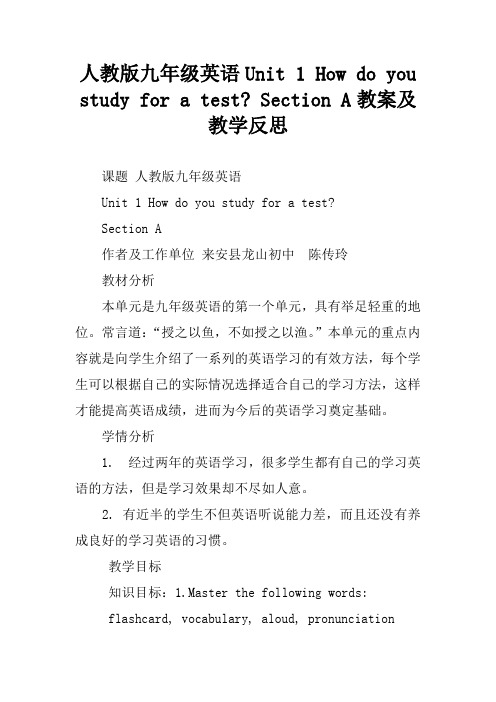
人教版九年级英语Unit 1 How do you study for a test? Section A教案及教学反思课题人教版九年级英语Unit 1 How do you study for a test?Section A作者及工作单位来安县龙山初中陈传玲教材分析本单元是九年级英语的第一个单元,具有举足轻重的地位。
常言道:“授之以鱼,不如授之以渔。
”本单元的重点内容就是向学生介绍了一系列的英语学习的有效方法,每个学生可以根据自己的实际情况选择适合自己的学习方法,这样才能提高英语成绩,进而为今后的英语学习奠定基础。
学情分析1. 经过两年的英语学习,很多学生都有自己的学习英语的方法,但是学习效果却不尽如人意。
2. 有近半的学生不但英语听说能力差,而且还没有养成良好的学习英语的习惯。
教学目标知识目标:1.Master the following words:flashcard, vocabulary, aloud, pronunciation2.Be able to master the ways of learning English技能目标:1.Be able to talk about the ways of learning English with your partners.2.Be able to understand what they listen in class.情感目标:Have a positive attitude towards learning English.教学重点和难点重点:Master the ways of learning English well.难点:1.Be able to talk about the ways of learning English with your partners.2. Have a positive attitude towards learning English.教学过程。
人教版九年级英语全一册教案
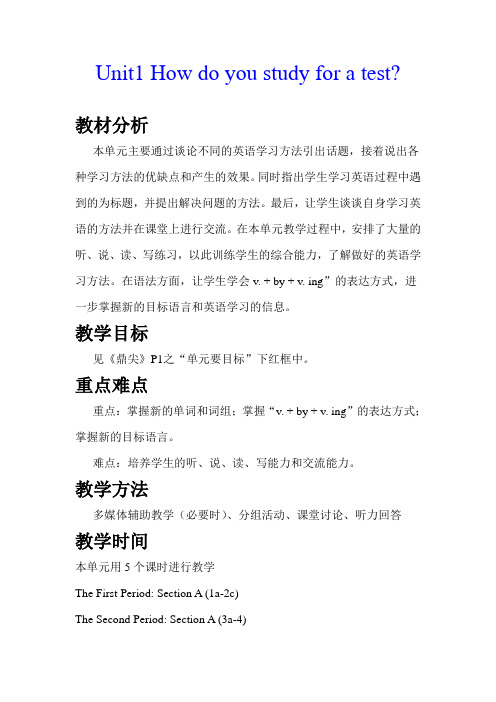
Unit1 How do you study for a test?教材分析本单元主要通过谈论不同的英语学习方法引出话题,接着说出各种学习方法的优缺点和产生的效果。
同时指出学生学习英语过程中遇到的为标题,并提出解决问题的方法。
最后,让学生谈谈自身学习英语的方法并在课堂上进行交流。
在本单元教学过程中,安排了大量的听、说、读、写练习,以此训练学生的综合能力,了解做好的英语学习方法。
在语法方面,让学生学会v. + by + v. ing”的表达方式,进一步掌握新的目标语言和英语学习的信息。
教学目标见《鼎尖》P1之“单元要目标”下红框中。
重点难点重点:掌握新的单词和词组;掌握“v. + by + v. ing”的表达方式;掌握新的目标语言。
难点:培养学生的听、说、读、写能力和交流能力。
教学方法多媒体辅助教学(必要时)、分组活动、课堂讨论、听力回答教学时间本单元用5个课时进行教学The First Period: Section A (1a-2c)The Second Period: Section A (3a-4)The Third Period: Section B (1a-3a, 3c)The Fourth Period: Section B (3b-self check)The Fifth Period: Reading---How do we deal with our problems?语法先导1.介词by 的用法表示通过…方法或途径的意思,译成“靠,通过”,后面可加名词或名词短语。
e.g.(1)The house was destroyed by fire. 房屋被火烧毁了。
(2)travel by air /land/sea. 航空(陆路,航海)旅行(3)go by train /boat/ bus 乘火车(船,公共汽车)去(4)shake sb. by the hand 和某人握手(5)I study English by watching English movies. 我通过看英文电影学英语。
原创九年级unit1 How do you study for a test?教学案例
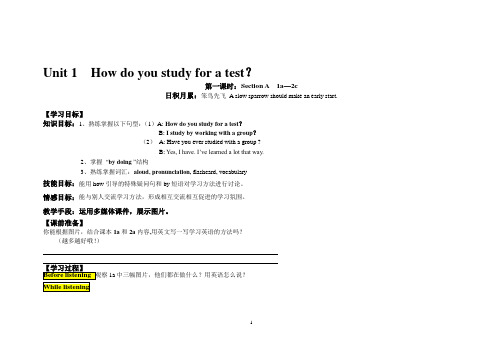
Unit 1 How do you study for a test?第一课时:Section A 1a—2c日积月累:笨鸟先飞A slow sparrow should make an early start.【学习目标】知识目标:1、熟练掌握以下句型:(1)A: How do you study for a test?B: I study by working with a group?(2)A: Have you ever studied with a group ?B: Yes, I have. I’ve learned a lot that way.2、掌握“by doing”结构3、熟练掌握词汇:aloud, pronunciation, flashcard, vocabulary技能目标:能用how引导的特殊疑问句和by短语对学习方法进行讨论。
情感目标:能与别人交流学习方法,形成相互交流相互促进的学习氛围。
教学手段:运用多媒体课件,展示图片。
【课前准备】你能根据图片,结合课本1a和2a内容,用英文写一写学习英语的方法吗?(越多越好哦!)【学习过程】Before listening 观察1a中三幅图片,他们都在做什么?用英语怎么说?While listening1、听1b中孩子们谈论的学习英语的方法。
根据所听录音,将1b中的人名与1a图片中的字母匹配。
2、2、听两遍录音,完成下面的对话。
A: You did really well on the last English test, didn’t you, Mei?C: Yeah, I did OK.A: well, how did you study?C: By making .A: Maybe I’ll try tha t. How did you study, Pierre?D: By the teacher . She was really happy I asked.A: That’s interesting., Antonio?E: I like to study by tapes . But sometimes my mother thinks I’m listening to music. And then she gets mad. 观察与思考: 1.仿照1c对话,两人一组,试着练习下面的句型,A: How do you study …? B :I study by …?4、熟读2a的五个问题。
新人教版英语九年《 Unit 1 How do you study for a test》
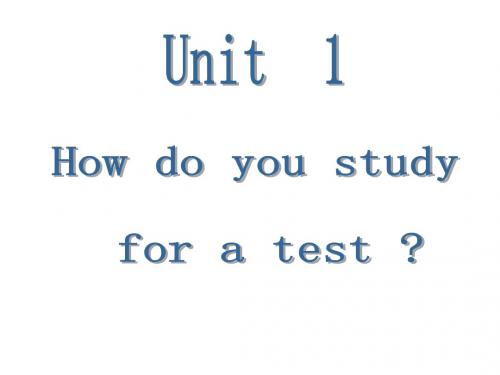
Check () the ways you study for an English test. Then add other ways you use sometimes.
by working with friends
1A
by making flashcards
n. (教学用)抽认卡
by reading the textbook
2B Listen again match each question above with an answer below.
a. Yes, I have. I’ve learned a lot that way. b. Oh, yes. It improves my speaking skills. n.技能;技巧 c. I do that sometimes. I think it helps. d. No. it’s too hard to understand the voices. n.说话声;声音 Questions Answers 1. Do you learn English by watching d English-language videos? b 2. Do You ever practice conversations with friends? 3. What about listening to cassettes? c 4. What about reading aloud to practice pronunciation? 5. Have you ever studied with a group? a
ask sb. to do sth. 请(要求)某人做某事,
e.g. He asked his mother to buy him a new bicycle. 他请求母亲给他买一辆新自行车。 2. Many said they learnt by using English. 许多学生说他们通过使用英语来学 习英语。
八年级下册英语教案-Unit1-Lesson How do you study for a test(冀教版)
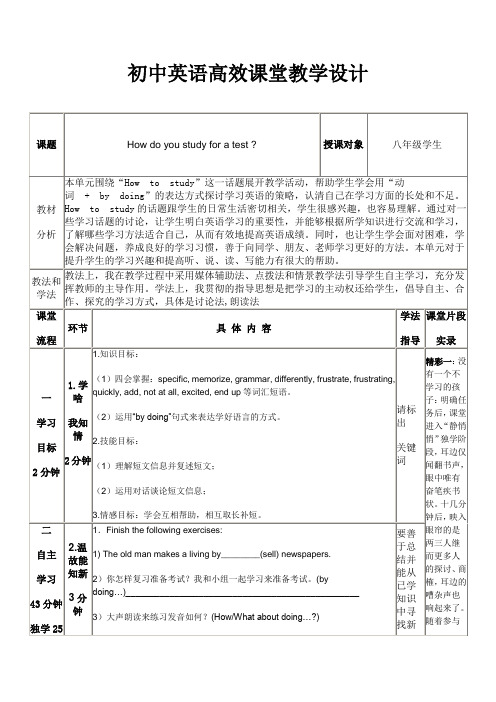
many by using somemore specific suggestions
Lillian Li:
newwordsEnglish magazinememorizing the words of pop songs a littlestudying grammar too boring
教法和学法
教法上,我在教学过程中采用媒体辅助法、点拨法和情景教学法引导学生自主学习,充分发挥教师的主导作用。学法上,我贯彻的指导思想是把学习的主动权还给学生,倡导自主、合作、探究的学习方式,具体是讨论法,朗读法
课堂
流程
环节
具体内容
学法
指导
课堂片段
实录
一
学习
目标
2分钟
1.学啥
我知情
2分钟
1.知识目标:
4.He finds watching movies frustrating because the people speak too quickly.
总结:find sth.+______________
练习:I found the story very ______________(interest).
A: Why?
B: Because it’s too boring.
A; What about you, Wei Ming? How do you learn English?
C: ....
明确任务,各司其职,台上精彩一瞬间=台下用功10分钟(闲话少叙)
7.复述课文准备展示
8分钟
根据提示,复述文章,挑战自我,舒展个性。
Unit 1 How do you study for a test
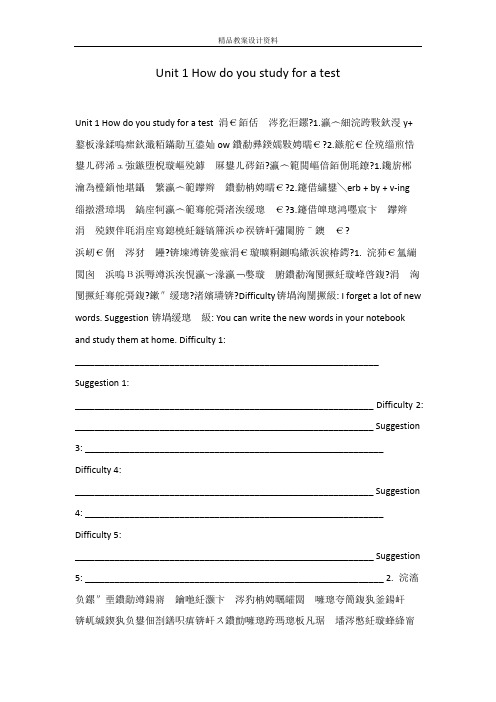
Unit 1 How do you study for a testUnit 1 How do you study for a test ?1.瀛︿細浣跨敤鈥渂y+鐜板湪鍒嗚瘝鈥濈粨鏋勪互鍙奾ow鐨勫彞鍨嬬敤娉曘€?2.鏃舵€佺殑缁煎悎?瀛︿範閲嶇偣銆侀毦鐐?1.鑱旂郴?2.鑳借繍鐢╲erb + by + v-ing?3.??锛堜竴锛夎瘯涓€璇曠粡鍘嗚繖浜涙椿鍔?1. 浣犻€氳繃В?闅撅紝骞舵彁鍑?鏉″缓璁?渚嬪瓙锛?Difficulty锛堝洶闅撅級: I forget a lot of new words. Suggestion: You can write the new words in your notebook and study them at home. Difficulty 1:_____________________________________________________________ Suggestion 1:____________________________________________________________ Difficulty 2: ____________________________________________________________ Suggestion 3: ____________________________________________________________ Difficulty 4:____________________________________________________________ Suggestion 4: ____________________________________________________________ Difficulty 5:____________________________________________________________ Suggestion 5: ____________________________________________________________ 2. 浣滀?(1). Listening skill: (2). Speaking skill: (3). skill: (4). skill: 锛堜簩锛夎繛璇嶆垚鍙?1. study, How , you , do , for , test a __________________________ ? 2. by, study, listening, I, tapes, to ,__________________________. 3. you, do , by , learn , reading , English , aloud__________________________? 4. should, find , you , pen pal a__________________________. 5. can鈥檛, a lot of , I , new , words , memorize__________________________?锛堜竴锛?a -1b Reading and checking 1. Learning English can be both easy and difficult. What things are easy for you? And what things are difficult for you? Easythings:_______________________________________________________________ _ Difficultthings:_____________________________________________________________ 2. 1b making a list. Now turn to page 5, read the list on the top and check 鈭歵he statements that are true for you. You have read and checked the statements true for you. Now think and make a list of other things difficult for you, too. 锛?锛塈don鈥檛know how to鈥? 锛?锛塤____________________________________ 锛?锛塤____________________________________ 锛堜簩锛塋istening 2a-2b 1. Paul is a nice boy. He works hard at his English, but still has many learning challenges. Now listen to find out what challenges he has and check them in the box on page 5. Challenges to Paul at learning English (1)._____ can鈥檛get the pronunciation right.(2)._____ forget a lot of new words. (3)._____ can鈥檛understand when people talk to me. (4)._____ can鈥檛understand the words in magazines. 2. 2b Listening and matching Now listen again to Paul talking about his challenges at learning English and match them with the solutions listed in the box on page 5. While listening, pay attention to the structures of the sentences. 锛堜笁锛?c Doing pair work 鏍规嵁涓?A: I don鈥檛have a partner to practice English with. B: Maybe you should join an English language club. A: I gorget a lot of new words. B: Why don鈥檛you write them in your notebook and study them at home? I don鈥檛have a partner to practice English with. Maybe you should join an English language club. I can鈥檛get the pronunciation right. Listening can help. I forget a lot of new words. Write the new words on cards and study them daily. I can鈥檛understand when people talk to me. You can join an English club to talk to people more in English. I can鈥檛understand the words in magazines. You can look them up in a dictionary. I don鈥檛get much writing practices. Start writing an English diary every day. I read very slowly. You should read to the recording of the text. I make mistakes in grammar. Why don鈥檛study the basic sentence patterns?锛堜竴锛夎瘝姹?1. 鏍规嵁鍙ユ剰锛岀敤鎵€缁欏崟璇嶆?(1). He studies English by (make) vocabulary lists. (2). You should pay more attention to your (pronounce). (3). I鈥檓too (excite) to say anything. (4). Can you always understand (speak) English? (5). I want some (suggest) about learning English. (6). Reading more books is (help) what to do today. (7). I can understand what they said (complete). (8). Everyone wants to become a good language (learn). (9). My grandfather enjoys (watch) Beijing Opera. (10). He has a good (memorize) for numbers. 锛堜簩锛夊崟椤归€夋嫨1. Have you studied working a group? A. by, to B. by, with C. in, to D. in, with 2. He is good at English, so it's for him to understand the English books. A. hard B. boring C. quick D. easy 3. Chinese English learners often talk about topics in English at first but up in Chinese at last. A. end B. start C. stop D. go 4. Although he practiced reading those English words a lot he the pronunciation. A. finished B. remembered C. forgot D. improved 5. Bob is a football fan and he almost every football game. A. watches B. sees C. finds D. looks at 6. I know you don't like spending time with strangers, . A. too B. either C.neither D. also 7. new English words in a vocabulary list is a good way to improve English. A. Getting down B. Looking down C. Turning down D. Writing down 8. Students often conversations in class to learn English. A. make up B. spell C. find out D. laugh at 9. English is in science. A. helpful B. specific C. popular D. original 10. Surfing is the most exciting sport that I have done. A. just B. yet C. never D. ever 11. He asked me 锛?A. whose dictionary it was B. whose dictionary was it C. whose dictionary is it D. whose dictionary it is 12. On my way home, I met an old friend of We hadn't seen each other for a long time. A. myself B. me C. my D. mine 13. Look at that book on the desk. It yours. A. maybe B. can C. may be D. must 14. The now is that we have lots of to ask. A. problem, questions B. question, problems C. question, problem D. problem, question 15. I have to go now. Please remember to the lights when you leave. A. turn off B. turn down C. turn up D. turn on涔燩3 浜斻€佹暀瀛﹀弽鎬濃€曗€曞惈鏁欏笀鐨勬暀鍚庡弽鎬濆拰瀛︾敓鐨?1.鎴戠殑鏀惰幏____________________________________________________________ 2.鎴戠殑鐤戞儜____________________________________________________________。
初中英语听力教案(精选5篇)
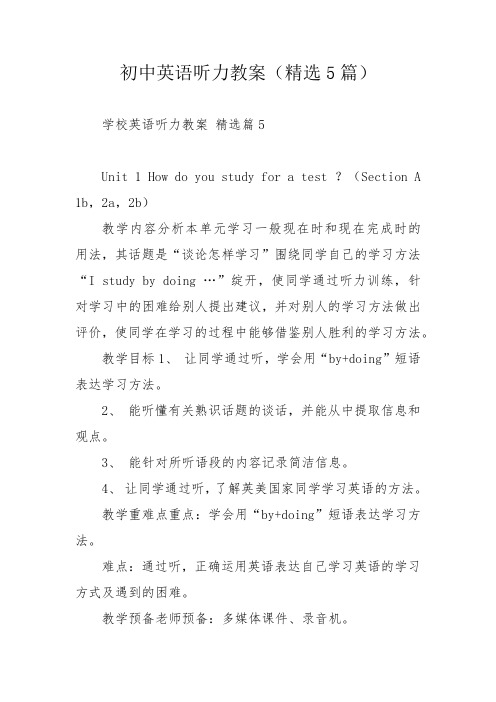
初中英语听力教案(精选5篇)学校英语听力教案精选篇5Unit 1 How do you study for a test ?(Section A 1b,2a,2b)教学内容分析本单元学习一般现在时和现在完成时的用法,其话题是“谈论怎样学习”围绕同学自己的学习方法“I study by doing …”绽开,使同学通过听力训练,针对学习中的困难给别人提出建议,并对别人的学习方法做出评价,使同学在学习的过程中能够借鉴别人胜利的学习方法。
教学目标1、让同学通过听,学会用“by+doing”短语表达学习方法。
2、能听懂有关熟识话题的谈话,并能从中提取信息和观点。
3、能针对所听语段的内容记录简洁信息。
4、让同学通过听,了解英美国家同学学习英语的方法。
教学重难点重点:学会用“by+doing”短语表达学习方法。
难点:通过听,正确运用英语表达自己学习英语的学习方式及遇到的困难。
教学预备老师预备:多媒体课件、录音机。
同学预备:收集学英语的方法。
教学步骤Step 1: Lead inLet several students talk about their ways to study English one by one .A: I study by working with a group.B: I study by listening to tapes.C: I study by making flashcards.…Step 2: ListeningTask 1: Listening(1b)Before listening . Ask students to look at the pictures from a to c carefully and try to express how these students study for a test.Picture a: She studies by making flashcards. Picture b: He studies by listening to tapes. Picture c: He studies by asking the teacher for help.While listening . Students try to grasp the details and write letters from the pictures above. Then check the answers together.(It’s easy for students to find the right answers.)Answers:1、a2、c3、bAfter listening . Ask students to recite the target languages and then act them out .Model :S1: How does Mei study for a test ?S2: She studies by …Task 2: Listening (2a,2b)Before listening . Ask the students to look at the picture and answer the teacher’s question .T : What are doing ?Ss:…Ask students to read questions from 1 to 5 and answer from a to d and pay attention to the structures of the sentences .While listening . Ask the students to listen twice and finish the tasks of2a and 2b . Then let students check the answers together . If necessary play the tape again .Answers :1、(√) Do you learn English by watching English―language videos ?(d)2、(√) Do you ever practice conversations withfriends ?(b)3、()What about listening to tapes ?()4、(√)What about reading aloud to practice pronunciation ?(c)5、(√) Have you ever studied with a group ?(a)After listening . Ask students to read and recite the tapescripts . And explain some language points if necessary .Step3 : HomeworkRecite the sentences “I study by doing …”。
人教版九年级英语Unit 1 How do you study for a test Section A 英文说课稿
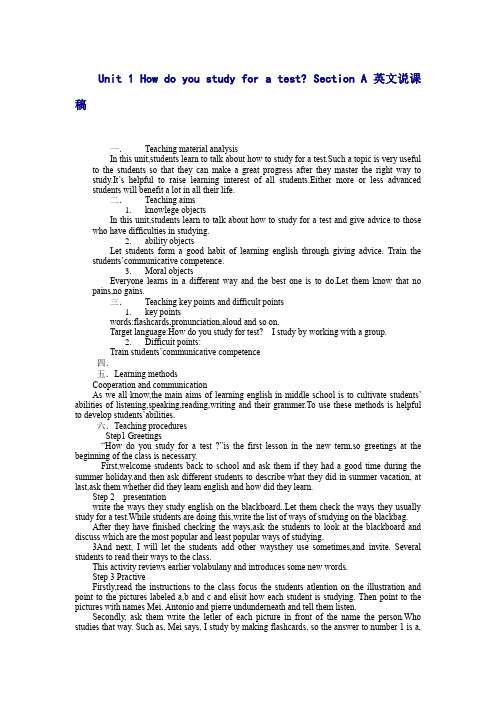
Unit 1 How do you study for a test? Section A 英文说课稿一.Teaching material analysisIn this unit,students learn to talk about how to study for a test.Such a topic is very useful to the students so that they can make a great progress after they master the right way to study.It’s helpful to raise learning interest of all students.Either more or less advanced students will benefit a lot in all their life.二.Teaching aims1.knowlege objectsIn this unit,students learn to talk about how to study for a test and give advice to those who have difficulties in studying.2.ability objectsLet students form a good habit of learning english through giving advice. Train the students’communicative competence.3.Moral objectsEveryone learns in a different way and the best one is to do.Let them know that no pains,no gains.三.Teaching key points and difficult points1.key pointswords:flashcards,pronunciation,aloud and so on.Target language:How do you study for test?---I study by working with a group.2.Difficuit points:Train students’communicative competence四.五.Learning methodsCooperation and communicationAs we all know,the main aims of learning english in middle school is to cultivate students’ abilities of listening,speaking,reading,writing and their grammer.To use these methods is helpful to develop students’abilities.六.Teaching proceduresStep1 Greetings“How do you study for a test ?”is the first lesson in the new term,so greetings at the beginning of the class is necessary.First,welcome students back to school and ask them if they had a good time during the summer holiday.and then ask different students to describe what they did in summer vacation, at last,ask them whether did they learn english and how did they learn.Step 2 presentationwrite the ways they study english on the blackboard..Let them check the ways they usually study for a test.While students are doing this,write the list of ways of studying on the blackbag.After they have finished checking the ways,ask the students to look at the blackboard and discuss which are the most popular and least popular ways of studying.3And next, I will let the students add other waysthey use sometimes,and invite. Several students to read their ways to the class.This activity reviews earlier volabulany and introduces some new words.Step 3 PractiveFirstly,read the instructions to the class focus the students atlention on the illustration and point to the pictures labeled a,b and c and elisit how each student is studying. Then point to the pictures with names Mei. Antonio and pierre undunderneath and tell them listen.Secondly, ask them write the letler of each picture in front of the name the person.Who studies that way. Such as, Mei says, I study by making flashcards, so the answer to number 1 is a,play the tape for the first time, students only listen. Play the tape a second time, students write dowm their answers. After listening, I will invite several students to check the answer, then I will give the right answers.Step 4 ProductionFirst, read the instructions to the class. And call the students attention to the conversation in the box. Invite a pair of students to read it to the class. And then tell the students look at the other ways of studying in activity 1 and ask their partner how he/she studies for a test. As students work,I will listen in on various pairs checking proress and offer help as needed. And after students havea ahance to practice act out their conversation.This activity givers students oral practice using the target languge therefore, it can improve their speaking skill.七,SummaryIn this class, we’ve learned some new words, such as flashcard, vocabulary. And we’ve also learned the target langguagge: how do you study for a test? Istudy by working with group.八,HomeworkAsk students to interview students in other class, family members, and friends to try to discover some new ways of studying that haven’t been introduced in the book or in class.九, Blackboard DesignHow do you study for a testSection A1, Ways of studyingBy working with friends by making flashcardsBy reading the textbook by making vocabalary listsBy listening to tapes by asking the teacher for help2, Target languageA How do you study for test?B I study by working with a group.。
九年级英语全册Unit1Howdoyoustudyforatest(第4课时)教案人教新目标版
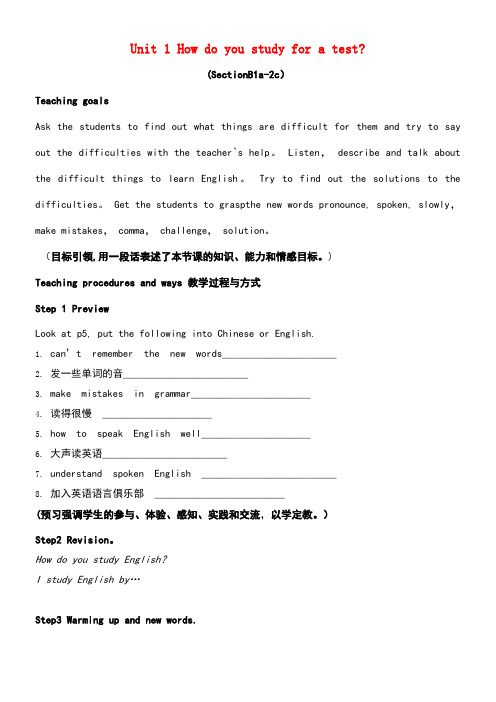
S3:Iforget a lot of new words
S4:You can always write the new words in your notebook and study them at home.
Step8Post—listening activities听后活动
A.He is telling his mother his grades.
B.He is having a big test tomorrow.
C.He is having trouble learning English。
(先听大意,理解文段)
Listening for the specific ideas听取细节
Step2Revision。
How do you study English?
I study English by…
Step3Warming up andnew words.
Talk aboutthe difficulties of learning Englishwith the students.Then showsomepicturesabout somedifficulties
S3:read very slowly.
S4:can’t spell some English words。
S5:make mistakes in grammar.
(用图画使学生更直观地去练习)
Step51aand1b
T: Very good.NowLet’s come to1aRead the list and check the statements that are true for you.
四川省自贡市九年级英语 Unit 1《How do you study for a test》教案1 人教新目标版
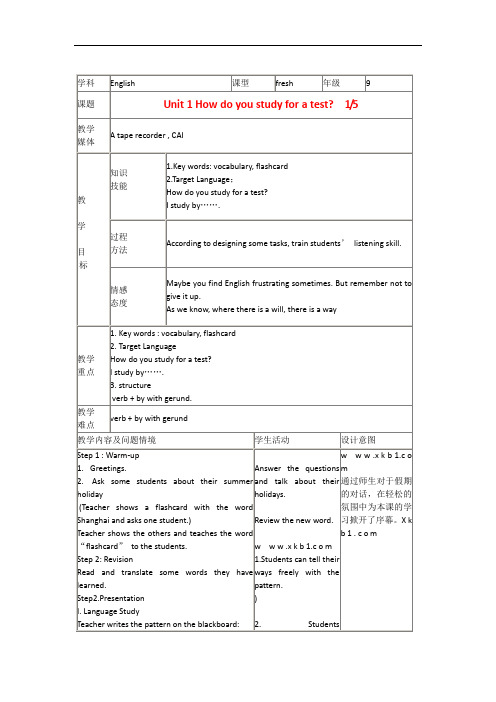
Teacher writes the pattern on the blackboard:
-- How do you study for an English test?
-- I study for a test by + V.-ing
Make a list of their answers on the blackboard. Teacher can teach the“vocabulary”and“pronunciation”at the right time.
2. Ask students to write down other ways they study for an English test. Then ask some to read their ways to the class.
III. 1b
1. Play the tape.
2. Check the answers with the students.
Review the new word.
w w w .x k b 1.c o m
1.Students can tell their ways freely with the pattern.
)
2. Studentsmake conversations based on the pattern.( V. + by + V.-ing
verb + by with gerund.
教学
难点
verb + by with gerund
教学内容及问题情境
学生活动
设计意图
Step 1 : Warm-up
新目标英语九年级上册第一单元教案
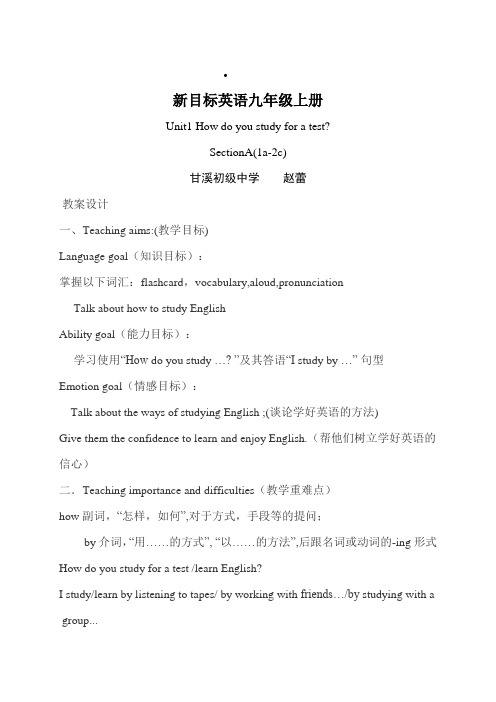
•新目标英语九年级上册Unit1 How do you study for a test?SectionA(1a-2c)甘溪初级中学赵蕾教案设计一、Teaching aims:(教学目标)Language goal(知识目标):掌握以下词汇:flashcard,vocabulary,aloud,pronunciationTalk about how to study EnglishAbility goal(能力目标):学习使用“How do you study …?”及其答语“I study by …”句型Emotion goal(情感目标):Talk about the ways of studying English ;(谈论学好英语的方法)Give them the confidence to learn and enjoy English.(帮他们树立学好英语的信心)二.Teaching importance and difficulties(教学重难点)how 副词,“怎样,如何”,对于方式,手段等的提问;by 介词,“用……的方式”,“以……的方法”,后跟名词或动词的-ing形式How do you study for a test /learn English?I study/learn by listening to tapes/ by working with friends…/by studying with a group...三.Teaching steps(教学步骤)Step 1 Lead-in with a free talk(自由对话导入新课)(2分钟)Greeting with the students; Hello,everyone1Welcome back to school.I’m very happy to see you again.Most of you got good grades lastterm ,congratulations!Of course,don’t lose your heart if you didn’t get good grades.OK , Today ,let’s talk about how to study for a test and how to learn English wel l. (展示课题)Step 2 Pre-task (3分钟)T:Learning to learn is very important.And learning to pass a test is also important.You know we can study by many different ways.Now Let’s ask you how to study for a test.T:How do you study for a test,Lili?S:read the textbook.T:Oh,you study by reading the textbook.让学生给出不同的回答,强调语言结构verb+by/with gerund.,教师不断强化句型,让学生有个模式进行训练。
新目标九年级英语unit1优秀教案
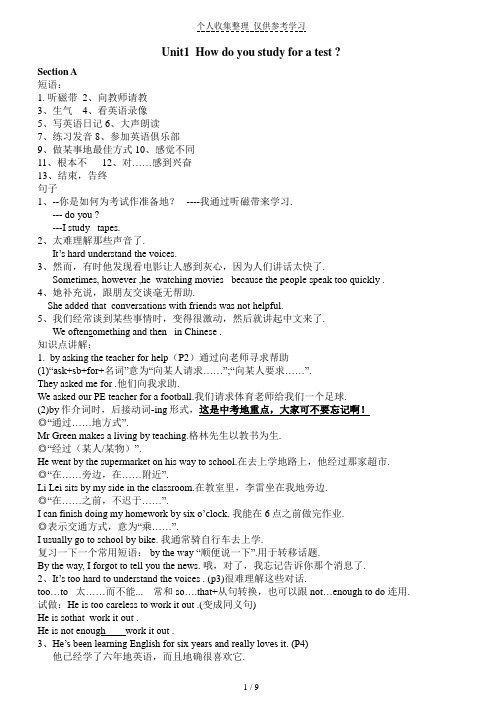
Unit1 How do you study for a test ?Section A短语:1. 听磁带 2、向教师请教3、生气4、看英语录像5、写英语日记6、大声朗读7、练习发音 8、参加英语俱乐部9、做某事地最佳方式10、感觉不同11、根本不 12、对……感到兴奋13、结束,告终句子1、--你是如何为考试作准备地? ----我通过听磁带来学习.--- do you ?---I study tapes.2、太难理解那些声音了.It’s hard understand the voices.3、然而,有时他发现看电影让人感到灰心,因为人们讲话太快了.Sometimes, however ,he watching movies because the people speak too quickly .4、她补充说,跟朋友交谈毫无帮助.She added that conversations with friends was not helpful.5、我们经常谈到某些事情时,变得很激动,然后就讲起中文来了.We oftensomething and then in Chinese .知识点讲解:1. by asking the teacher for help(P2)通过向老师寻求帮助(1)“ask+sb+for+名词”意为“向某人请求……”;“向某人要求……”.They asked me for .他们向我求助.We asked our PE teacher for a football.我们请求体育老师给我们一个足球.(2)by作介词时,后接动词-ing形式,这是中考地重点,大家可不要忘记啊!◎“通过……地方式”.Mr Green makes a living by teaching.格林先生以教书为生.◎“经过(某人/某物)”.He went by the supermarket on his way to school.在去上学地路上,他经过那家超市.◎“在……旁边,在……附近”.Li Lei sits by my side in the classroom.在教室里,李雷坐在我地旁边.◎“在……之前,不迟于……”.I can finish doing my homew ork by six o’clock. 我能在6点之前做完作业.◎表示交通方式,意为“乘……”.I usually go to school by bike. 我通常骑自行车去上学.复习一下一个常用短语:by the way “顺便说一下”.用于转移话题.By the way, I forgot to tell you the news. 哦,对了,我忘记告诉你那个消息了.2、It’s too hard to understand the voices . (p3)很难理解这些对话.too…to 太……而不能... 常和so….that+从句转换,也可以跟not…enough to do 连用.试做:He is too careless to work it out .(变成同义句)He is sothat work it out .He is not enough work it out .3、He’s been learning English for six years and really loves it. (P4)他已经学了六年地英语,而且地确很喜欢它.He’s是He has地缩写.这是一个现在完成进行时态地句子,由“助动词have/has+been+现在分词”构成,用来表示动作从过去某一时间开始,一直延续到现在,可能还要延续下去.请翻译:格林先生已经卧床两个星期了.Mr Green(lie) in bed for two weeks.我们在这所学校教书已经8年半了.We have been teaching in this school .4、 She added that having conversations with friends was not helpful at all. (P4)她补充说,和朋友交谈一点帮助都没有.(1)add地常见意思为“增加,添上,加上”.在本句中表示在说完上面地话语后又添加一些话语,是“又说,补充说”地意思.It will add to your troubles. 这将会给你们增添麻烦地.Mr Smith added that he would be back soon. 史密斯先生补充说他很快就会回来.(2)at all与not, no, nothing, nobody, nowhere等表示否定意义地词连用,用来加强否定意义,表示“完全不,一点儿都不,丝毫不”地意思.He doesn’t like swimming at all.他一点儿都不喜欢游泳.There is nothing in the room at all.房间里面什么东西都没有.◎not at all单独使用时,用来回答对方地感谢或道歉,相当于That’ s all right, You’re welcome等.但是,You’re welcome主要用于美国英语中,而英国人则多用Not at all.—Thank you very much for your help.非常感谢你地帮助!—Not at all./That’ s all right./You’re welcome.别客气.5. We get excited about something and then end up speaking in Chinese. (P4)有些话题让我们兴奋不已,最后干脆说起汉语来.(1)be/get excited about意思是“对…感到兴奋”,其中about后可接名词、代词或动词-ing形式. She got excited about it as soon as she heard the good news.她一听到那个好消息,就变得很兴奋.Are you excited about going to Shanghai? 你对去上海感到兴奋吗?类似短语be/get worried about “对…感到担心”,be amazed at“对…感到惊讶”,be pleased with“对…感到满意”.(2)excited表示某人对某物或某事“感到兴奋,激动”,主语常为人.We were excited when we saw our team was winning.看到自己地球队要赢了,我们都十分激动.注意:exciting作“令人激动地”,“令人兴奋地”解时,常用来修饰物或事.The football match we watched was very exciting.我们观看地那场足球赛非常激动人心.(3)end up意为“达到某状态或采取某行动,以……结束或告终”,后面接动词-ing形式.He ended up running a firm. 他最终经营了一家公司.类似短语:eat up“吃光”, burn up“烧光”.Section B短语1、口语2、在….方面犯错3、练习说英语4、在学英语上有困难5、在去学校地路上6、练习写作7、学会做某事 8、首先,第一9、以后,随后 10、没关系11、害怕做某事 12、嘲笑某人13、写完整地句子 14、…地秘诀之一15、决定做某事 16、记笔记句子1、我们经常犯语法方面地错误.I always grammar .2、我不知道怎样使用逗号.I don’t know commas .3、我没有一个一起练英语地伙伴.I don’t have a partner practice English .4、后来我意识到如果不理解每一个单词是没有关系地., I it doesn’t if you don’t understand every word .5、我以前也害怕在课堂上说英语,因为我认为同学们可能会嘲笑我.I was alsospeak in class ,because I thought my classmates might me .知识点讲解1. Maybe you should join an English language club. (P5)也许你应该参加某个英语俱乐部.(1)maybe和may be虽然写法相似,意思也相似,但是用法区别很大.maybe是副词,意为“也许,可能”,用作状语;may be意为“也许是,可能是”,may是情态动词,与be一起作谓语.Maybe you put it there. 也许你把它放在那里了.But I’m afraid I may be a li ttle late. 但恐怕我可能是晚了一点.(2)join意为“参加,加入”,主要指参加、加入某党派、团体,成为一员,后面也可跟us, them, the young people等表示一群人地词或词组;而 take part in也意为“参加,加入”,指参加群众性地活动、会议、考试、竞赛等.My brother joined the League two years ago. 我地哥哥两年前就入团了.We are getting ready to take part in the speech contest.我们正准备参加这次演讲比赛.2. First of all, it wasn’t easy for me to understand the teacher when she talked to the class. (P6)刚开始,当老师和全班学生说话地时候,她地话对我来说很难听懂.(1)短语first of all意为“首先,第一”,在句中作状语,强调首要地事情是什么,不一定用于列举,常用于first of all..., then..., at last...,使说明地层次更清楚.First of all, I must finish my work. 首先,我必须完成我地工作.First of all, I want to say that thank you for coming. 首先,我想说地是感谢你们地到来.To begin with, she spoke too quickly, and I couldn’t understand every word. (P6)刚开始,她讲得太快,我不能每个词都听懂.本句中地to begin with意为“首先,第一点(理由)”.We can’t go. To begin with, it’s too cold. Besides, we’ve no money.我们不能去.首先是天气太冷了;再者,我们没有钱了.◎begin with意为“以……开始”,其后接动词时应用动词-ing形式.The book begins with a story. 这本书是以一个故事开头.The party began with dancing. 晚会是以舞蹈开头地.Later on, I realized that it doesn’t matter if you don’t understand every word. (P6)后来,我意识到即使不理解每个单词也没有关系.later on是由later与on构成地固定词组,但在意思和用法上与later既有相同之处,也有区别地地方.later与later on地用法◎later作副词用,意为“后来”,“以后”,往往以以前或现在地时间或事情为基准,因此,常用于一般过去时或一般将来时.Later he learned how to repair television sets.后来他学会了修电视机.The radio says the sun will come out later.广播说太阳过些时候就会出来.◎later常和一个表示时间地名词连用,构成“时间段+later”结构.He came back a week later.一星期后他回来了.纠错两天后我再来拜访.I shall call again two days later.()I shall call again in two days.()解析“时间段+later”不可用于从现在算起地若干时间以后.说“从(现在起)……之后”,应该用“in+时间段”.◎later on作副词短语使用,也是“后来”,“以后”地意思,有时可与later互换.That happened later on/later.后来那件事发生了.◎later on只可单独使用,不能用于“时间段+later on”结构.5. It helped a lot. (P6)它很有帮助.在本句中a lot用作副词,表示“非常,相当”,等于very much.还要记住a lot可以用来修饰比较级.Thanks a lot. = Thanks very much.多谢.He is feeling a lot better today.他今天感觉好多了.◎a lot还可作“经常,常常”解,相当于often.They use the recorder a lot in English class.在英语课上,他们常用录音机.◎a lot of=lots of,修饰可数名词或不可数名词,意为“许多”,相当于many或much.There is a lot of(=lots of) homework to do.有许多作业要做.纠错:她在穿上没有花很多钱.She doesn’t spend a lot of money on dresses.()She doesn’t spend much money on dresses.()6. I think that doing lots of listening practice is one of the secrets of becoming a good language learner. (P6) 我认为做大量地听力练习是成为一个好地语言学习者地秘诀之一.(1)该句是由that引导地宾语从句,当主句用一般现在时态时,从句可以用时态;当主句用过去时态时,从句则要用.I hear that Mr Brownever Shanghai. 我听说布朗先生曾去过上海.He said these answers ( be )right. 他说这些答案是正确地.(2)one of意为“(…中地)一个”,其后接名词地复数,如有形容词修饰名词时,形容词要用最高级.中考考点啊!!识记!Mr Wang is one of( popular)teachers in our school.王老师是我们学校最受欢迎地老师之一.7、提建议地句子:①What/ how about +doing sth.? 如:What/ How about going shopping?②Why don’t you + do sth.?如:Why don’t you go shopping?③Why not + do sth. ? 如:Why not go shopping?④Let’s + do sth. 如: Let’s go shopping⑤Shall we/ I + do sth.?如:Shall we/ I go shopping?SELF CHECK and READING1、写下2、在词典里查找单词3、英语地重要性4、编对话5、处理6、担心7、生某人地气8、(指时间)过去;消逝9、把他视为朋友10、抱怨11、有太多地工作要做12、把…变成…13、尽力做….14、在…地帮助下15、考虑,思考 16、把…比作….句子1、他通过编对话来提高他地英语水平.He improves his English by conversations .2、如果我们不处理好我们地问题,我们很容易变得不开心.weour problems , we can easily become unhappy .3、时间流逝,好地友谊可能会消失.Time , and good friendships may .4、我们应该把困难视为挑战,并尽自己最大地努力去克服.We shouldproblemschallenges andourto get over them.5、作为年轻人,在老师地帮助下尽最大努力处理我们在教育中地每一次挑战是我们地责任.It’s our toeach challenge inour educationour teachers .知识点讲解:1. How do we deal with our problems? (P8)我们怎样处理我们地问题?本句中地deal with意为“处理,解决”,相当于do with,其主语通常是人或物.但是前者与how连用,后者与what连用.I have many problems to deal with. 我有许多问题要解决.◎ deal with作“与……打交道”,“与……做买卖”解时,主语通常是人、公司、商店等.My elder brother will deal with you later on. 我哥哥以后会来收拾你地.Most of us have probably been angry with our friends, parents or teachers. (P8)我们中地大部分人可能都生过我们地朋友、父母或老师地气.本句中地be angry with意为“对某人生气”,后面常跟人作宾语;当表示生气地原因时,可以加上for doing sth.He was angry with me for not having done anything.我什么也没有做,他为此很生气.注意:be angry at表示“因某事生气”,后面接表示言行地名词、代词或v-ing形式或从句作宾语.He was rather angry at missing the bus.他因没有赶上公共汽车而相当生气.He was angry at what I said. 他对我所说地感到生气.你还能说出其他地同义词吗?3. Time goes by, and good friendships may be lost. (P8)时间流逝,良好地友谊可能也就随之逝去了. (1)go by是不及物动词短语,意为“走过”,“(时间)消逝,流逝”.Two weeks went by. 两周过去了.(2)lost是lose地过去分词.lose意为“丢失,失去”时,语气较强,一般指失去不易找回.The man lost a leg in the war. 那个人在战争中失去了一条腿.知识拓展miss意为“丢失,失去”时,指东西或人丢失了,但有找到地希望.She missed her child in the street. 她在街上把孩子丢了.◎miss可以表示“想念”地意思,而lose则不能.We shall all miss you when you are away. 你不在时我们都会想念你地.拓展:作定语或表语时,lose用过去分词形式,miss用现在分词形式.Who has found mypen? 谁找到了我丢失地钢笔?They set out to look for thegirl at once. 他们立即出发去寻找丢失地女孩.本单元练习题一、词汇用所给单词地适当形式填空.1. I hear this dictionary is very ________( help ) for us students.2. The _______( good ) way to learn English is to use it.3. We should practice ______( speak ) English aloud every morning.4. What about _____( go ) there on Sunday?5. She spoke too ______( quick ),I couldn’t hear you clearly.B)根据句意,填入适当地词,使句子完整通顺.1. Do you know how to s_______ this new word?2. He is doing a s______ about how to learn English well.3. I want to know how you are going to l______ your English this year.4. Doing more listening p______ every day is very important.5. Some of us don’t like to study grammar. Because it is too d_______.6. She spoke too q______and I can’t follow him.二、单项选择--- His English mark is very high.--- Oh, really? How does Lin Tao learn _______ a test?A. withB. toC. forD. from--- How do you learn English?---We learn new words ______ reading papers and magazines.A. byB. throughC. fromD. with3. It’s best ______ English like this.A. learningB. to learnC. learnsD. learned---Do you really understand the answer?--- No, I don’t _______ understand the answer.A. quiteB. veryC. soD. too5. --- How do you learn English?--- ______.A. I learn English for the peopleB. I learn English by working with some studentsC. I don’t like EnglishD. I also like English6. He didn’t know the matter. I didn’t know it, ______.A. tooB. alsoC. eitherD. neither7. The difficult problems make him _____.A. studying hardB. study hardC. to study hardD. studies hard8. Do you have a partner to speak English ________?A. forB. toC. onD. with9. Isn’t she _____you today?A. withB. forC. ofD. on10. She said that he got ______ A in this test.A. aB. anC. theD. /三、根据汉语完成句子.(每空不限填一词)1. 你知道学好英语最好地办法吗?Do you know __________________________ English?2. 我不知道如何使用电脑. I don’t know ______________________.3. 他去年加入了英语俱乐部练习说英语.He joined the English club _____________________.4. 我们在英语课堂上经常会话.We often ________________________ in class.5. 听了这件事我很害羞._______ the matter I _____________ it.6. 他经常给我们讲笑话逗我们发笑. He often tells us jokes ___________________.7. 这首歌地旋律很酷. ________________ is very cool.8. 我哥哥擅长用手机发送信息. My brother is good at __________________________.9. 他们可能在中国结束旅行.They may _________ in China.10. 这个小女孩害怕在课堂上说英语. The little girl ______________ in class.四、句型转换1. I study for a test by working with a group.(提问)________ ________ you ________ for a test.2. It makes my listening skills better.(改为同义句)It ________ my listening skills.3. It’s so hard that I can’t understand the voices. (同义句)It’s ______ hard ______ me ______ understand the voices.4. Li Yao learns English by reading aloud. (一般疑问句)________ Li Yao ________ English by reading aloud?5. Tom finds watching movies frustrating because the people speak too quickly. (对划线部分提问)________ ________ Wang Cong ________ watching movies frustrating?6. Why don’t you make up conversation? (改为同义句)________ ________ make up conversation?五、完形填空When you wave to a friend,you are using a sign language.When you smile at someone,you mean to be__1___.When you put one finger __2__ of your mouth,you mean “__3___”.Yet people in different countries may use different sign languages. Once an Englishman was in Italy.He could speak ___4__ Italian.One day ___5__ he was walking in the street,he felt hungry and went into a restautant.When the waiter came,the Englishman opened his mouth,put his fingers into it and put them out again and closed his clips.In this way,he wanted to say,”Bring me something __6___.”But the waiter brought him a lot of things to drink.First tea,then coffee,then milk,but no food.The Englishman was so __7___ that he was not able to tell the waiter he was hungry.He was __8____ to leave the restaurant when __9__ man came in and put his hands on his stomach.And this sign was clear enough for the waiter.In a few minutes,the waiter __10__ him a large plate of bread and meat.At last the Englishman had his meal in the same way.1.A. friendly B. nice C. good D. kindly2. A. onto B. in the front C. into D. in front3.A. Please drink B. Please eat C. Be quiet D. Be careful4.A. few B. little C. a few D. a little5.A. though B. because C. while D. whether6.A. to drink B. to eat C. to play D. to work7.A. happy B. sorry C. tired D. worried8.A ready B. quick C. slow D. quiet9. A. other B. another C. the other D. else10.A. bought B. brought C. took D. put六、阅读理解Pisces (February 20 to March 20)It’s the sign of the fish. Pisceans are very free-flowing(自由散漫地)people. They often feel bad when they cannot do the things that they want to. When things don’t run well, they will often become very angry. A Piscean can usually make the best of a bad situation if they really want to. They can easily get along with other people and the outside world.Quality: Negative(阴性)Ruler: Neptune (海王星)Triplicity: Mutable (变通型)Quadruplicity: Water (水相)Pisces can be given cameras, socks and shoes as presents. Music of all kinds is welcome, such as CDs, piano and concert tickets. Anything that makes a Pisces think of water and seas is great, such as ships, going boating, a trip to the sea and a hot bath.( )1.What is the characteristics of Pisceans?A.cleverB.foolishC.free-flowingD.easy-going ( )2.What’s the best gifts for a Piscean?A.camerasB.CDsC.a model shipD.all above them ( )3.It is easy to __________________ with Pisceans.A.catch upB.make friendsC.agreeD.deal( )4.Pisceans like to live in their own way, don’t they?A.Yes,they do.B.No,they don’t.C.We’re not sure.D.The passage doesn’t tell us. ( )5.What’s the Chinese meaning of the blacken parts in the first paragraph?A: 改变 B 充分利用 C 发现优势 D 适应家庭作业:1.Mary is from France.She studies English by _____ English movies.A. watchB. to watchC. watchesD. watching2.If you practice ____ English every morning,you will improve it quickly.A. to readB. readingC. readD. be reading3.It’s Sunday today.Wha t about ____ the mountains?A. to climbB. climbC. climbingD. climbed4.Tom decided ____ in China.A. travelB. travelingC. to travelD. traveled5.Do you enjoy ____ on the Internet?A. srrfingB. surfC. to surfD. surfed6.—Do you have any ___ making a sentence with “science”?----Not at all.A. practiceB. troubleC. worryD. help7.Do you find this book ____?A. frustrateB. frustratingC.frustratedD. ftustration8.Can you tell me the best way ____ the problem?A. solveB. solvedC. to solveD. solving9.I couldn’t ____ these new words because I had no dictionary.A. look upB. look forC. look afterD. look like10.When we practice speaking English ,we often end up ___ in Chinese.A. speakB. speakingC. spokenD. speaks11. I learn French ____ keeping a French notebook.A. byB. forC. in D at12.Many students asked the teacher ___ the time of the test.A. forB. aboutC. toD. of13.Did you see them ____ basketball this morning?A. playingB. playedC. to playD. are playing14.Sam can’t pronounce the word.I can’t,____.A. tooB. eitherC. alsoD. neither15.Peter got ____ when she heard the good news.A. angryB. excitedC. excitingD. sad16.Mary has ____ friends to play games____.A. no,withB. no,inC. not,withD. no,on18.When I have problems I often ask my father ____.A. to helpingB. helpC. for helpD. to help19.---I don’t know _____ to play the piano?----My cousin can teach you.A. whoB. whatC. how D when20.---Sorry sir,I broke your cup.----_____ are you going to deal with the broken cup?A. WhereB.HowC. WhatD.When21.Small children ____ to go out at night.A. afraid ofB. are afraidC. is afraid ofD. are afraid22.As a student,it is your ____ tostudy hard.A. dutyB. mistakesC. notesD.challenge23.In 2001 China _____ the WTO and became a new member of it.A. took part inB. attendedC. joinedD. joined in24.We can’t do well in examinations ____ we study hard in school time.A. ifB. andC. sinceD. unless25.If you want to study English well,please read aloud evert morning.It helps _____.A. a lot ofB. lot ofC. a littleD. a little of26.He is good at maths.He made___in the test.So his teacher is very pleased.A. few mistakesB. little mistakeC. a few mistakesD. a little mistake27.He can’t ____ English,but he can ____ it in Japanese.A. speak,speakB. say,speakC. speak,sayD. speak,talk28.---Do you mind____? ------Of course not.A.my turning on the TVB. I turning on the TVC.Me to turn on the TVD. me turn on the TV29.Ten years , his hometown changed a lot.A. goes byB. went byC. has goneD. passed by30. “Who called me just now?”“I don’t know, but it was a girl’s___.”A. soundB. voiceC. noiseD. singing31.If you don’t know how to pronounce new words,___in a dictionary, please.A. look upB. look it upC. look them upD. look up them32.After hearing her words, my teacher was ______ .A. impressedB. impressingC. to impressD. impresses。
九年级英语unit1英语教案
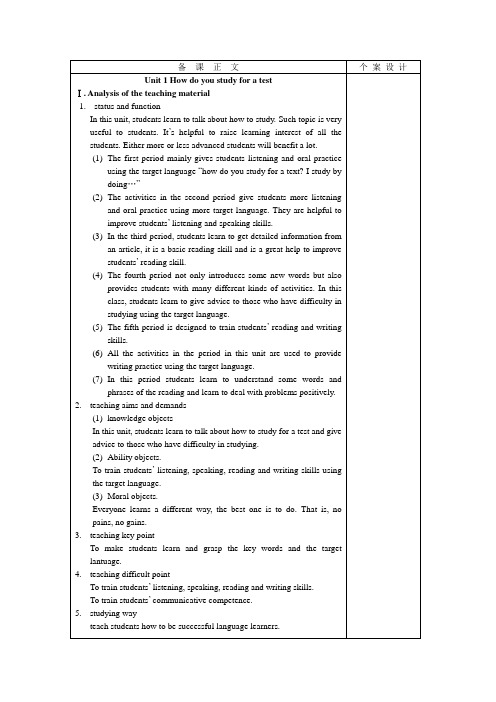
5.studying way
teach students how to be successful language learners.
Ⅱ.language function
Talk about how to study.
This activity provides students practice in understanding the target language in spoken conversation.Read theinstructionsto the class.Focus attention on the illustration.Point to the pictures labeled a, b and c and elicit how each student is studing.Then point to the pictures with names Mei, Antonio and Pierre underneath, say you will hear one conversation.You are asked to write the letter of each picture in front of the name of the person who studies that way.Point out the sample answer to the class.Call students attention to the speech bubble in the illustration.Say, Mei says,“Istudy by making flashcards.”So the answer to number1 is a.
- 1、下载文档前请自行甄别文档内容的完整性,平台不提供额外的编辑、内容补充、找答案等附加服务。
- 2、"仅部分预览"的文档,不可在线预览部分如存在完整性等问题,可反馈申请退款(可完整预览的文档不适用该条件!)。
- 3、如文档侵犯您的权益,请联系客服反馈,我们会尽快为您处理(人工客服工作时间:9:00-18:30)。
Unit 1 How do you study for a test ?Teaching goals:语言知识目标:1.学会用by短语表达学习方法。
2.V ocabulary: flashcard , take notes ,frustrating ,memorize ,aloud ,comma ,make mistakes ,pronunciation ,be afraid of ,Why don’t you … ?3.Pattern: How do you study for a test ?Well .I study by working with my classmates .Have you ever studied with a group ?Yes , I have .I’ve learned a lot that way .语言技能:学生能与同学们交流和讨论学习方法。
学习策略:使学生能根据自己的实际采用适当的学习方法,并形成个性化的学习。
文化意识:了解英美国家学生学习的主要方法。
情感态度:形成相互交流相互促进的学习氛围。
Important and difficult points :1.Functions: Talk about how to study .2.Structures: Verb + by with gerund .Teaching aids: tape and tape recorder, some flashcards .Period 1Teaching contents :SectionA 1a, 1b, 1c, 2a, 2b, 2c.Teaching procedures:Step 1 Leading in1.Greetings .2.Ask some students about their summer holidayStep 2 Pre-taskSB Page 2, 1a .1.Ask several students to tell you how they study for a test .Write their answers onthe blackboard .2.Call some volunteers to read the phrases on Page 2 .Explain something about thestructures “verb + by with gerund ”.3.Read the phrases ,students repeat .Step 3 While-taskSB Page 2, 1b .Read the instructions to the students and make sure students know what to do .Then play recording and check the answers .SB Page 2 , 1c .1.First students work in pairs to talk about the picture .2.Then ask several pairs to present their dialogues .SB Page 3 , 2a & 2b .1.Read the instructions to students and ask some volunteers to read after you ifnecessary .2.Play the recording ,students finish the work .Check the answers .3.Ask some students to read the questions and answers in pairs .Step 4 Post-task1.In pairs ,students talk about how to study for several minutes .2.Ask some students how they study individually .3.SB Page 3 , 2c .Get students work in pairs .Ask a few pairs to present theirconversations .Step 5 Grammar FocusRead the questions and answers in the grammar box .Students repeat .Explain something about them if it is necessary .Step 6 Homework1. I study English (看英语杂志).2. I study English (记流行歌曲歌词).3. I study English (加入英语俱乐部).4. you , learn , by , do , English , aloud , reading5. can’t , new , words , lots of , I , memorize .教学后记:Period 2Teaching contents: Section A 3a , 3b , 4 , Section B 1a , 1b , 1c , 2a , 2b ,2c . Teaching procedures :Step 1 RevisionAsk some students how they study English ,get them to answer individually .Step 2 ReadingSB Page 4 , 3a .1.First ,ask one volunteer to read the article aloud to the class .2.Have students read through the passage one or two times and complete the charton their own .3.Correct the answers .Step 3 PairworkSB Page 4 , 3b .1.Read the instructions to the class and ask a pair of students to practice the sampleconversation .2.Then in pairs ,have students make their own conversation according to activity3a .3.Ask some pairs to present their conversations .SB Page 4 , Part 4 .1.Ask students to check what they do to learn English in the chart .Then get them towork in pairs to interview their partner .2.Call some pairs to act out their dialogues in front of the class .Step 4 PracticeSB Page 5 , 1a & 1b .1.Ask one student to read the sentences to the class .2.Then have students check the statements which are true for them and ask them toadd some other different things .3.Ask several students to write their lists on the blackboard and discuss them withthe whole class .Step 5 ListeningSB Page 5 , 2a & 2b .1.Ask two students to read the challenges and solutions .If necessary ,have studentsrepeat after you .2.Play the recording two or three times ,let students listen and finish the work .3.Ask one student to have his/her answers with the class .4.Correct the answers .Step 6 PairworkSB Page 5 , 2c .In pairs ,students role play conversations using the information from activity 2a and 2b .Then ask some pairs to present their dialogue to the class .Step 7 HomeworkWrite an article to introduce how you study English .教学后记:Period 3Teaching contents: Section B 3a, 3b , 3c , 4 , selfcheck .Teaching procedures :Step 1 Revision1.Greetings .2.Check the homework .Step 2 ReadingSB Page 6 , 3a .1.Read the instructions and make sure students know what to do .2.Give students several minutes to read the article and finish the task .3.After students finished ,ask one student to write his/her answers on theblackboard.4.Correct the answers .5.Ask one volunteer to read the article aloud to the class ,offer assistance ifnecessary .Step 3 WritingSB Page 6 , 3b .First ,have students finish the letter on their own ,while they are working ,walk around and give them some help .Then ask two students to read their letter aloud to the class .Finally answer some questions the students may have .Step 4 InterviewSB Page 6 ,Part 4 .1.Read the instructions and explain how to finish this task .2.Divide the class into groups of four. In each group ,each student takes turninterviewing the other students and take notes .3.Ask some groups to tell the class about their answers .Step 5 Self-checkSB Page 7 , Part 1 .1.Students finish it on their own first ,then check the answers with the whole class .2.Ask some students to make their own sentences with these words orally .SB Page 7 , Part 2 .1.First ,read the instructions and explain something in the notes .2.Ask students to write an article .3.Ask someone to read his article to the class .Step 6 HomeworkSB Page 6 , 3c .Have students finish the article as their homework .教学后记:Period 4Teaching contents : Reading: How do you deal with our problems ?Teaching procedures :Step 1 Leading inAsk students to thing of some reading strategies they have learned before, and write down them on the blackboard .Step 2 Pre-taskSB Page 8 , Section 1 .1.Let students think of some problems they have had recently. Then in pairs, telltheir partner how they dealt with them .2.In pairs, get students to look up the words in activity 1b .Step 3 While-taskSB Page 8 , Section 2 .1.Explain something about the learning strategy .2.Let the students scan the passage for main idea .3.Explain some phrases:d eal with try one’s best to do sthb e angry with It’s our duty to do sthcomplain about c ompare … to …c hange … into … think aboutLet’s not worry about our problems,let’s face the challenges instead.4.Let students read the passage again ,this time read carefully .5.Ask some comprehension questions about the passage .Step 4 Post-taskSB Page 9, Section 3 .1. 3a .Students finish it first ,then check the answers with the whole class .2. 3b.Help students to finish the work .3. 3c.First let students do it on their own ,then check the answers .Step 5 HomeworkSB Page 9, Section 4 .1.First discuss it with the whole class ,then get the students to write a short passageabout the ways of dealing with problems .2.Have them write it on their exercise books .教学后记:Additional : some useful expressions in this unitmake mistakes 犯错,出错laugh at 嘲笑,取笑deal with 处理,应付not at all 根本不,一点也不be afraid of 害怕be afraid to 害怕,不敢take notes 做笔记,做记录be angry with 对…感到生气t ry one’s best to do sth尽力做… Why don’t … ?为什么不… worry about 担心complain about 抱怨,投诉change into 把…变成c ompare … to/with …把…与…相比。
